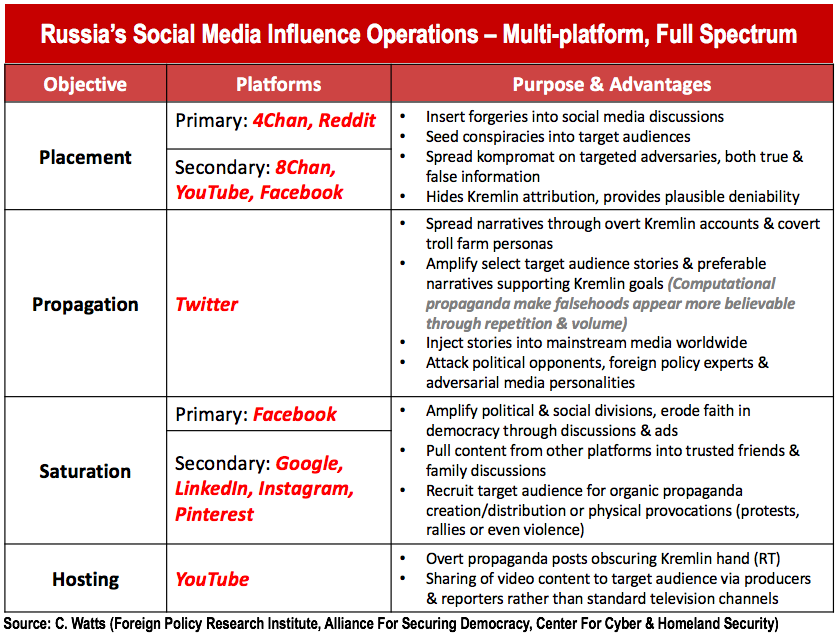tijd
in
puppet_djt
Силиконовые слушания
:format(webp)/cdn.vox-cdn.com/uploads/chorus_image/image/57413603/868741578.0.jpg)
Фейсбук, Твиттер и Гугл прислали своих корпоративных адвокатов давать показания в Конгрессе.
Во вторник в юридической комиссии Сената: Extremist Content and Russian Disinformation Online: Working with Tech to Find Solutions
https://www.judiciary.senate.gov/meetings/extremist-content-and-russian-disinformation-online-working-with-tech-to-find-solutions
В среду в комиссии по разведке Сената: Social Media Influence in the 2016 U.S. Elections
https://www.intelligence.senate.gov/hearings/open-hearing-social-media-influence-2016-us-elections
В среду в комиссии по разведке Палаты представителей: Russia Investigative Task Force Open Hearing with Social Media Companies
https://intelligence.house.gov/calendar/eventsingle.aspx?EventID=814
В своих вопросах некоторые конгрессмены демонстрирвали картинки российских троллей, созданные с явным намерением повлиять на выборы.
Например, обманным путем понизить явку сторонников Клинтон:
:format(webp)/cdn.vox-cdn.com/uploads/chorus_image/image/57413737/Screen_Shot_2017_10_31_at_4.21.09_PM.0.png)
Сравнение Клинтон с дьяволом и т.д.:

This graphic of Jesus and Hillary Clinton is an actual post shared by the Russian page “Army of Jesus,” released during #TechHearings. pic.twitter.com/XKFLGnoXu4
- Mark Warner (@MarkWarner) November 1, 2017
Интересные моменты в выступлениях:
1. Дайэнн Файнстайн: “I don’t think you get it. What we’re talking about is a cataclysmic change. What we’re talking about is the beginning of cyber warfare…You bear this responsibility. You’ve created these platforms. And now they are being misused. And you have to be the ones to do something about it. Or we will.”
It’s a fact, tech platforms were used by foreign actors to influence 2016 election. Changes need to be made so this never happens again. pic.twitter.com/77E7e7PXQt
- Sen Dianne Feinstein (@SenFeinstein) November 1, 2017
2. Эл Франкен: “How did Facebook, which prides itself on being able to process billions of data points and instantly transform them into personal connections for its users, somehow not make the connection that electoral ads paid for in rubles were coming from Russia? Those are two data points! American political ads, and Russian money, rubles. How could you not connect those two dots?”
3. Ангус Кинг: "“[Information] warfare is the division of our society. And it’s not only us - it’s the entire West,” said Senator King in his questioning. “We know that the Russians were involved in the French election [and] we know that they were involved in the German elections…This is a sophisticated, worldwide strategy that applied here in 2016… [and] it’s still happening…We as a society, we have to understand when we’re being conned.”
2. Марк Уорнер:
For Facebook, much of the attention has been focused on the paid ads Russian trolls targeted to Americans. However, these ads are just the tip of a very large iceberg. The real story is the amount of misinformation and divisive content that was pushed for free on Russian-backed pages, which then spread widely on the News Feeds of tens of millions of Americans.
According to data Facebook has provided, 120 Russian-backed Pages built a network of over [3.3] million real people.
From these now-suspended Pages, 80,000 organic unpaid posts reached an estimated 126 million real people. That is an astonishing reach from just one group in St. Petersburg. And I doubt that the so-called Internet Research Agency represents the only Russian trolls out there. Facebook has more work to do to see how deep this goes, including looking into the reach of the IRA-backed Instagram posts, which represent another 120,000 pieces of content - more Russian content on Instagram than even Facebook.
The anonymity provided by Twitter and the speed by which it shares news makes it an ideal tool to spread disinformation.
According to one study, during the 2016 campaign, junk news actually outperformed real news in some battleground states in the lead-up to Election Day.[1] Another study found that bots generated one out of every five political messages posted on Twitter over the entire presidential campaign.[2]
I’m concerned that Twitter seems to be vastly under-estimating the number of fake accounts and bots pushing disinformation. Independent researchers have estimated that up to 15% of Twitter accounts - or potentially 48 million accounts - are fake or automated.[3]
Despite evidence of significant incursion and outreach from researchers, Twitter has, to date, only uncovered a small percentage of that activity. Though, I am pleased to see, Twitter, that your number has been rising in recent weeks.
Google’s search algorithms continue to have problems in surfacing fake news or propaganda. Though we can’t necessarily attribute to the Russian effort, false stories and unsubstantiated rumors were elevated on Google Search during the recent mass shooting in Las Vegas. Meanwhile, YouTube has become RT’s go-to platform. Google has now uncovered 1100 videos associated with this campaign. Much more of your content was likely spread through other platforms.

Вместе с тем Ричард Бёрр подчеркнул, что микротаргетинг у российской пропаганды хромал - некоторые рекламы запускались в штаты, где у Трампа не было шанса. Это аргумент против подозрений в координации с кампанией Трампа.
4. Клинт Уоттс, из показаний в юридической комиссии Сената:
The U.S. government, social media companies, and democracies around the world don’t have any more time to wait. In conclusion, civil wars don’t start with gunshots, they start with words. America’s war with itself has already begun. We all must act now on the social media battlefield to quell information rebellions that can quickly lead to violent confrontations and easily transform us into the Divided States of America.
https://www.fpri.org/article/2017/10/extremist-content-russian-disinformation-online-working-tech-find-solutions/

Проблема понятна. Непонятно, что с ней будут делать дальше, и вмешается ли Конгресс, чтобы надавить на компании, ответственные за социальные сети.